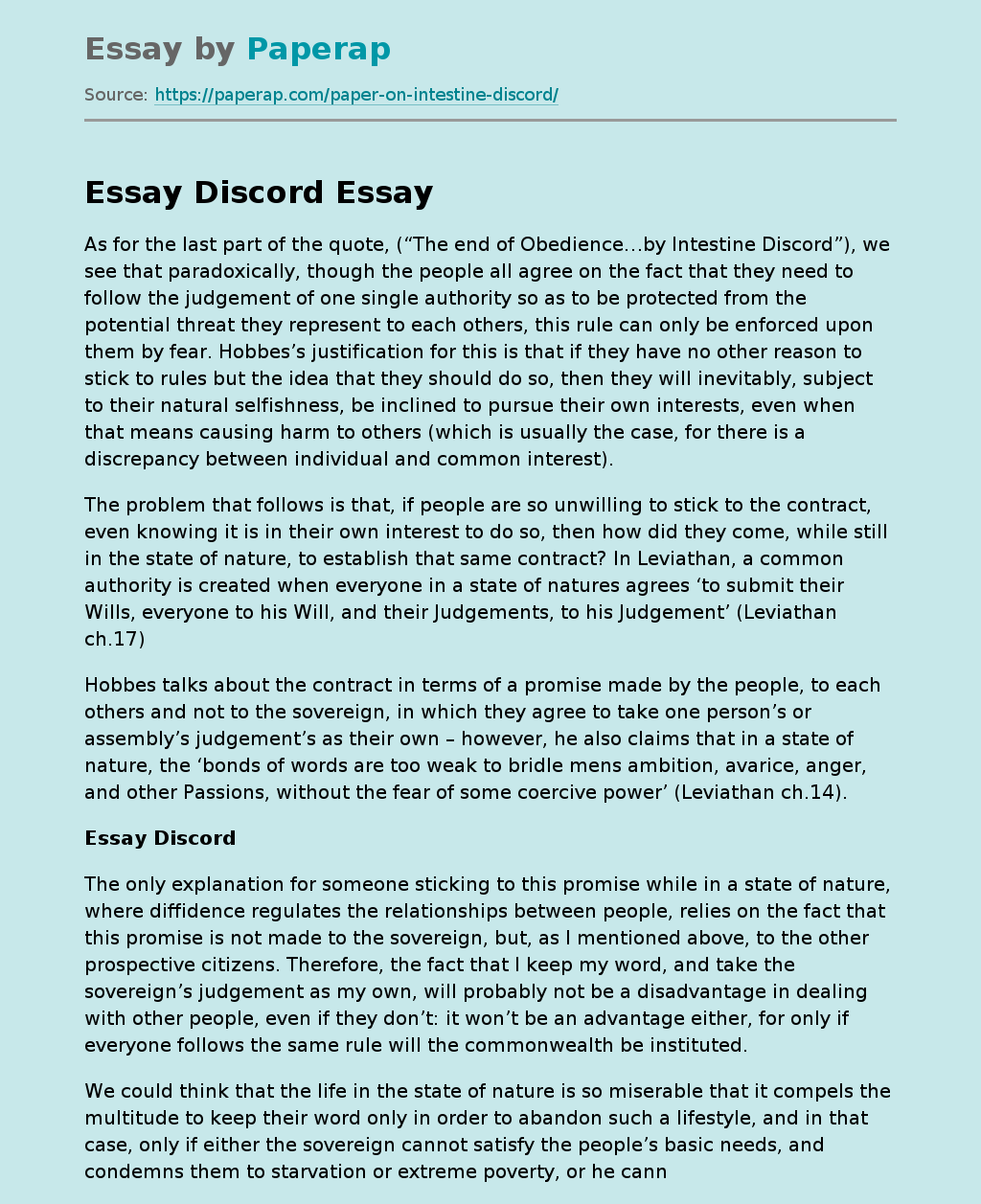The End of Obedience: Paradoxical Agreement on Intestine Discord
As for the last part of the quote, (“The end of Obedience…by Intestine Discord”), we see that paradoxically, though the people all agree on the fact that they need to follow the judgement of one single authority so as to be protected from the potential threat they represent to each others, this rule can only be enforced upon them by fear. Hobbes’s justification for this is that if they have no other reason to stick to rules but the idea that they should do so, then they will inevitably, subject to their natural selfishness, be inclined to pursue their own interests, even when that means causing harm to others (which is usually the case, for there is a discrepancy between individual and common interest).
The problem that follows is that, if people are so unwilling to stick to the contract, even knowing it is in their own interest to do so, then how did they come, while still in the state of nature, to establish that same contract? In Leviathan, a common authority is created when everyone in a state of natures agrees ‘to submit their Wills, everyone to his Will, and their Judgements, to his Judgement’ (Leviathan ch.
17)
Hobbes talks about the contract in terms of a promise made by the people, to each others and not to the sovereign, in which they agree to take one person’s or assembly’s judgement’s as their own – however, he also claims that in a state of nature, the ‘bonds of words are too weak to bridle mens ambition, avarice, anger, and other Passions, without the fear of some coercive power’ (Leviathan ch.
14).
Essay Discord
The only explanation for someone sticking to this promise while in a state of nature, where diffidence regulates the relationships between people, relies on the fact that this promise is not made to the sovereign, but, as I mentioned above, to the other prospective citizens. Therefore, the fact that I keep my word, and take the sovereign’s judgement as my own, will probably not be a disadvantage in dealing with other people, even if they don’t: it won’t be an advantage either, for only if everyone follows the same rule will the commonwealth be instituted.
We could think that the life in the state of nature is so miserable that it compels the multitude to keep their word only in order to abandon such a lifestyle, and in that case, only if either the sovereign cannot satisfy the people’s basic needs, and condemns them to starvation or extreme poverty, or he cannot find the appropriate laws to control his people’s opinions will his regime come to an end.
Of the former case I have already spoken, as far as the latter is concerned, Hobbes was, curiously enough, particularly concerned about humanists, a kind to which he had belonged himself in his youth, for, he thought, they misread the texts of the Ancients; they praised republican liberties out of their context, and wanted it for themselves, whereas for Hobbes it was precisely those wishes for individual liberties that could lead to the ‘death’ of the commonwealth, for the freedom of men only means discord.
In conclusion, I shall say that although Hobbes’s account of how to govern a state seems to inevitably lead to a very authoritarian rule, such commonwealth could just as well turn out to be a libertarian state, since much is left – and that is, I think, what seems most striking to us today – to the character of the sovereign. A parallel could be drawn with Marx’s thought, if we consider that such sovereign sought to keep his authority by increasing his subjects’ wealth – which Hobbes does indeed suggest – and, introducing this materialist point of view, we could imagine a hobbesian state to be very close to Marx’s ideal communist society: one where the individuals wellbeing would be assured, leaving them free to pursue their own interests in different areas.
Such comparison, however, ignores the fact that whereas for Hobbes there is no such thing as society, and only the representative can indeed act, for Marx the opposite is true, i.e., the people are those who have the real power; moreover, whereas Hobbes thinks that authority of one person or assembly is the only way to avoid civil war, Marx rather sees the rule of one group of persons as the source of internal conflict. Whereas one seeks to abolish freedom, and sees in it the source of all ‘Intestine Discord’, the other seeks to free the man in order to eliminate conflict.
Both, however, suggest rather extreme types of government; both produced, in different ways, visionary accounts of society, and, what is more, it should not be forgotten that Hobbes sought to – as did Marx – abolish preconceived ideas: he denied that kings’ power could be of a divine nature, and introduced the idea that it actually came from the people – although his conception of representation was, as we’ve seen, very different of our modern interpretation of it (which implies a two-way, interactive relationship), he was the one who introduced this concept, undeniably a crucial one in modern politics.
The End of Obedience: Paradoxical Agreement on Intestine Discord. (2019, Dec 05). Retrieved from https://paperap.com/paper-on-intestine-discord/

